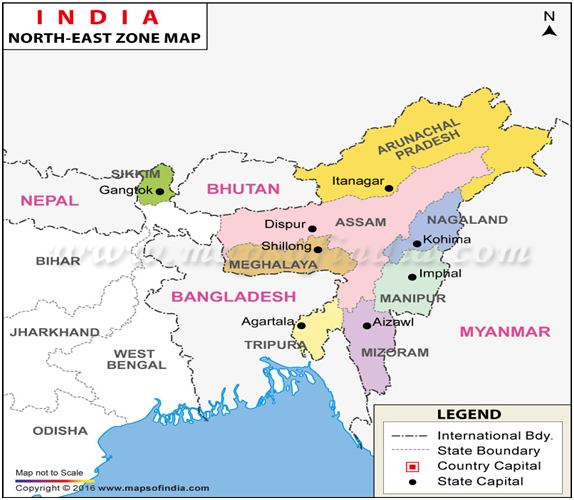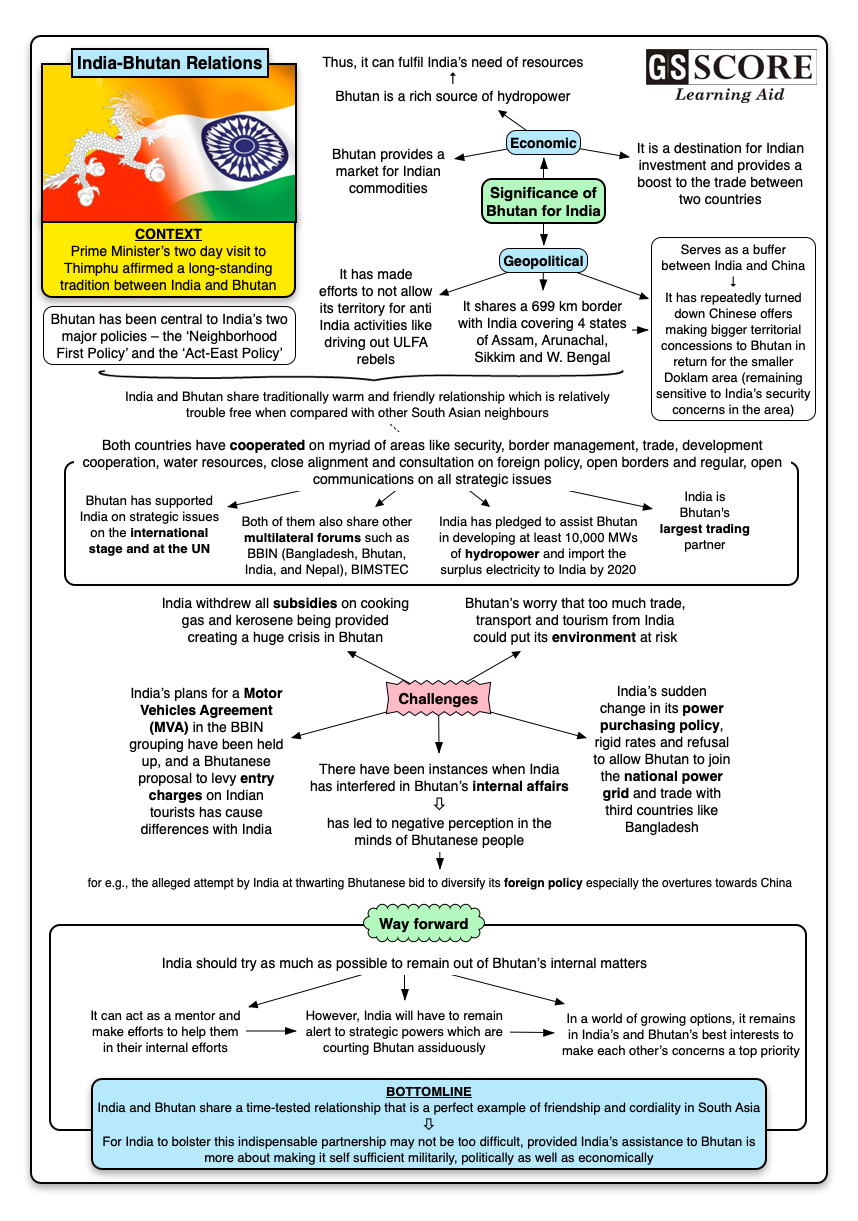

Prime Minister’s two day visit to Thimphu affirmed a long-standing tradition between India and Bhutan.
Issue
Context
Prime Minister’s two day visit to Thimphu affirmed a long-standing tradition between India and Bhutan.
Background
- Bhutan was a protectorate of British India and came under the British suzerainty in 1865. It signed the ‘Treaty of Punakha’ with the British in 1910, which set the stage for any future contact between the two countries after the British left the subcontinent.
- India’s relations with Bhutan were handled by a Political Officer based in Sikkim. This continued until 1948, when a Bhutanese delegation visited India and wished to revise the treaties previously signed with the British
- After India’s independence in 1947, standstill agreements with Sikkim, Nepal and Tibet were signed to continue existing relations until new agreements were made. For Bhutan, its status became clearer following Nehru?s invitation for a Bhutanese delegation to participate in the Asian Regional Conference in 1947.
- Diplomatic relations between India and Bhutan were established in 1968 with the establishment of a special office of India in Thimphu.
- Sharing a 699 Kilometers border, India and Bhutan shares a deep religion-cultural links. Guru Padmasambhava, a Buddhist saint also played an influential role in spreading Buddhism and deepening traditional ties between people in both nations.
- The basic framework of India- Bhutan bilateral relations was the Treaty of Friendship and Cooperation signed in 1949 between the two countries.
- The Golden Jubilee of the establishment of formal diplomatic relations between India and Bhutan was been celebrated in the year 2018.
- India and Bhutan share traditionally warm and friendly relationship which is relatively trouble free when compared with other South Asian
- The two countries have always shared a unique and organic relationship which is often termed as a ‘sacred bond’, largely sustained by regular high level visits and dialogues between the neighbors.
- Bhutan has been central to India’s two major policies – the ‘Neighborhood First Policy’ and the ‘Act-East Policy’.
Bhutan’s Significance to India
- Bhutan shares border with four Indian States: Assam, Arunachal Pradesh, West Bengal and Sikkim.
- Bhutan serves as a buffer between India and China.
- Bhutan provides a market for Indian commodities and is a destination for Indian investment along with providing boost to the trade between two countries.
- Bhutan is a rich source of hydropower. Thus, can fulfill India’s need of resources.
- Politically stable Bhutan is very important to India, as unstable situations in Bhutan can provide a safe haven to anti-India activities and anti-India militant groups.
- Bhutan has never played the China card against India unlike Nepal which always threatens for the same.
- Bhutan has repeatedly turned down Chinese ‘package deal’ offers making bigger territorial concessions to Bhutan in return for the smaller Doklam area (remaining sensitive to India’s security concerns in the area).
- Bhutan’s effort to drive out ULFA rebels was of a great significance.
- Bhutan’s Happiness index which is adopted by India (Madhya Pradesh) also is a great initiative learnt from Bhutanese.
Areas of Cooperation
- There are a number of institutional mechanisms between India and Bhutan in areas such as security, border management, trade, transit, economic, hydro-power, development cooperation, water resources.
- There have been regular exchanges at the Ministerial and officials’ level, exchanges of parliamentarian delegations to strengthen partnership in diverse areas of cooperation.
- India has pledged to assist Bhutan in developing at least 10,000 MWs of hydropower and import the surplus electricity to India by 2020.
- Inauguration of the 720 MW Mangdechhu hydropower plant which is of great significance for both the countries.
- Open borders, close alignment and consultation on foreign policy, and regular, open communications on all strategic issues are the hallmark of the relationship that has maintained its consistency for the past many decades.
- Bhutan’s unequivocal support to India on strategic issues has meant a lot to India on the international stage and at the United Nations.
- India is Bhutan's largest trading partner. Major exports from India to Bhutan are mineral products, machinery and mechanical appliances, electrical equipments etc. whereas major items of import from Bhutan are electricity, ferrosilicon, Portland cement etc.
- Both of them also share other multilateral forums such as BBIN (Bangladesh, Bhutan, India, and Nepal), BIMSTEC.
- There is a Joint Group of Experts (JGE) on flood management between India and Bhutan to discuss the probable causes and effects of the recurring floods and erosion in the southern foothills of Bhutan and adjoining plains in India.
- Prestigious Nehru-Wangchuk Scholarship is being awarded to deserving and talented Bhutanese nationals to undertake studies in selected and premier Indian educational Institutions.
Challenges in the relation
- There have been instances when India has interfered in Bhutan’s internal affairs. This has led to negative perception of India in the minds of Bhutanese people.
- Ties came under a strain over India’s sudden change in its power purchasing policy, rigid rates and refusal to allow Bhutan to join the national power grid and trade with third countries like Bangladesh.
- Bhutan’s worry that too much trade, transport and tourism from India could put its environment at risk.
- India’s plans for a Motor Vehicles Agreement (MVA) in the Bangladesh-Bhutan-India-Nepal grouping have been held up, and a Bhutanese proposal to levy entry charges on Indian tourists has cause differences with India.
- Earlier generations of Bhutanese students never looked beyond India, but in recent years young Bhutanese have shown a preference for education destinations in Australia, Singapore and Thailand.
- India withdrew all subsidies on cooking gas and kerosene being provided to Bhutan creating a huge crisis in Bhutan that strained the bilateral ties.
- The crisis in Indo-Bhutan relations exploded apparently, over alleged attempt by India at thwarting Bhutanese bid to diversify its foreign policy especially the overtures towards
Way forward
- India and Bhutan share a time-tested relationship that is a perfect example of friendship and cordiality in South Asia. For India to bolster this indispensable partnership may not be too difficult, provided India’s assistance to Bhutan is more about making it self sufficient militarily, politically as well as economically.
- With India’s help, Bhutan can become economically competitive, militarily advanced and self reliant in matters of national security.
- Furthermore, as world’s largest democracy, India can guide Bhutan in developing requisite democratic infrastructure and a political establishment that can sustain the demands of a democratic society.
- India should try as much as possible to remain out of Bhutan’s internal matters; it can act as a mentor and make efforts to help them in their internal efforts.
- Bhutan however, until recently as per the treaty obligation of 2007 followed the Indian direction, kept India’s interest in mind and evaded a settlement with China.
- Bhutan does not rely on powers outside the region for the maintenance of a strategic order in the South Asian region; India should always harness the potential.
- India will have to remain alert to strategic powers which are courting Bhutan assiduously, as is evident from the high-level visits from China and the U.S. In a world of growing options, it remains in India’s and Bhutan’s best interests to make each other’s concerns a top priority.

Learning Aid



